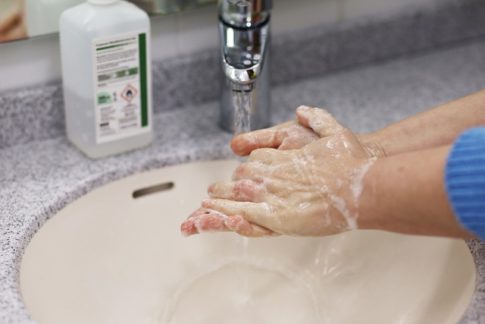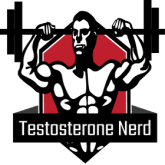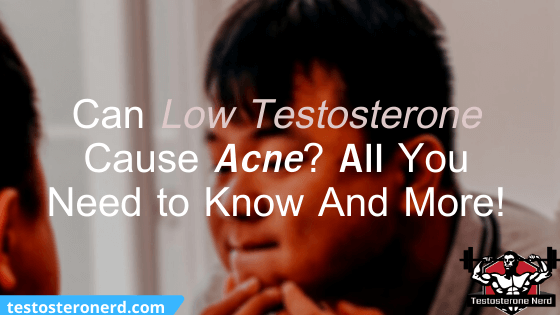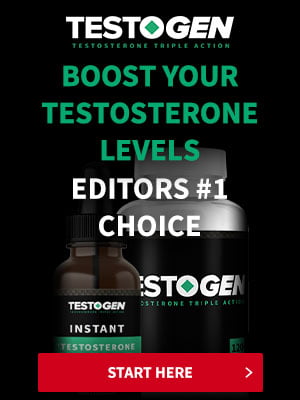We men run on a particular fuel known as testosterone – our primary male hormone. It’s what gives us those distinctive masculine characteristics such as stronger and bigger muscles, a deeper voice, beard, body hair etc. Apparently our skin is affected by big T as well. So in this sense – can low testosterone cause acne?
Yes, according to relevant scientific data low testosterone can indirectly lead to skin issues such as acne although that’s uncommon (1).
That’s because the skin is androgen-dependent, meaning it’s affected by the levels of predominantly male hormones such as testosterone.
However, it’s worth noting that the researchers propose the prevalence of such skin conditions in relation to low T is far from significant!
Nonetheless, hypogonadism (the decreased production of testosterone) is indeed related to our skin and its condition.
What is Acne (Acne Vulgaris)?
Acne or acne vulgaris is an inflammatory skin condition that appears when your hair follicles become blocked.
This blockage can happen when dead skin, sebum, bacteria and hair create a plug that causes the formation of those dreaded pimples.
And depending on their formation, there are several different types of acne:
- Papules – Small, pink and tender bumps.
- Pustules – Pus-filled, tender bumps that have a red bottom and white top.
- Blackheads – Open, black bumps that rise to the skin’s surface
- Whiteheads – Closed bumps under the skin that can be white or skin-colored.
- Cysts – Painful and deep lumps beneath the skin surface that can cause scars
- Nodules – Big, solid pimples under the skin
Typically, acne tends to appear in areas such as the face, upper back, shoulders and chest.
It’s also more predominant in teenagers although you can suffer from acne at any age.
And while generally acne isn’t considered a serious or life-threatening condition, it can lead to scars that the result from popping the pimples.

What is the Relationship Between Acne and Testosterone?
The link between the two is called sebum since testosterone stimulates the production of this waxy substance.
Sebum is secreted by the sebaceous glands and a potential change in the secretion of this substance is typically considered one of the main reasons that lead to acne.
- Also read: When is low testosterone dangerous?
Interestingly enough, the skin on the face is jam-packed with sebaceous glands that produce sebum.
And while puberty-related acne is perfectly normal and to be expected, the condition known as hormonal acne is far worse as it can manifest itself even when you’re older.

Can Low Testosterone Cause Skin Problems?
Yes – low T can lead to skin problems including the aforementioned acne, while also having the potential to worsen other chronic skin conditions.
For instance, the skin tends to dry out due to insufficient testosterone levels, which has a negative impact on psoriasis.
And as we already pointed out, our sex hormones affect the state of our skin and skin appendages.
Researchers from the journal of Dermatology found that men who suffer from psoriasis have lower T levels than men without this condition (2)!
Although this might suggest that low T could potentially lead to the development of psoriasis, that’s not actually the case.
The same scientists discovered no real correlation between the role of sex hormones (like testosterone) in the formation of psoriasis, implying that further research might be needed.
Nonetheless, it’s still clear that men with psoriasis tend to have lower T levels (according to these researchers) than guys without it so feel free to draw your own conclusions!

Does High Testosterone Lead to More Acne in Comparison to Low Testosterone?
Absolutely – an elevated T production is one of the main reasons behind the breakout of acne.
A scientific review by the Dermato-Endocrinology journal shows that acne patients have more testosterone in their skin as opposed to healthy individuals i.e. without acne (3).
- Also read: Will low testosterone cause fatigue?
Apparently, higher T levels are associated with an increase in sebaceous gland activity.
This in return can lead to hyperseborrhea (the overproduction of sebum) that can in return result in inflammation that sets off acne.
Low Testosterone Is Less Likely To Trigger Acne Breakouts!
Although we’ve already mentioned that low T can indeed cause acne, it’s far from a frequent occurrence – especially when compared to high T levels.
Sure, research points out that skin condition and androgen hormones (like testosterone) are related.
And as evident from the first study we cited, hypogonadism can make your skin thinner, while leading to more wrinkles at the same time.
But you’re much more likely to face an acne breakout if your body has high concentrations of testosterone.

How Do You Clear Up Acne?
Getting rid of acne can be a slow and tedious process that can take weeks.
But there are particular conventional and alternative methods that you can use to eliminate it for good:
- Wash your face at least twice every day
- Don’t pick or pop the pimples
- Get more Zinc in your diet or supplement with it
- Try mild face masks, exfoliants and scrubs
- Consume fewer sugars and carbohydrates in general
- Apply an antibacterial cleanser like benzoyl peroxide
- Get more quality sleep
- Give Retinol a try
Note that if your acne doesn’t improve regardless of your efforts, it’d be a good idea to visit a dermatologist for help.
Dermatologists specialize in diagnosing and treating all kinds of skin conditions, including acne vulgaris.
Thus, they can create an individual treatment plan for your particular situation to adequately get rid of those nasty pimples that can even leave scars.
How To Keep Your Testosterone Levels More Balanced?
By making certain lifestyle adjustments including dietary, habitual and other natural methods.
Here are some of the best ways to ensure that your testosterone levels are within the optimal range (300 – 1100 ng/dL):
- Exercise on a regular basis (weightlifting is an optimal choice)
- Avoid consuming refined foods, alcohol and simple carbohydrates (sugar)
- Try to get at least 8 hours of sleep per night
- Use supplements (vitamin D3, Zinc, Fenugreek or an all-in-one like TestoGen)
- Aim to keep stress at bay
Keep in mind that these recommendations are meant to support healthy testosterone levels.
They’re not meant to give you 10 times the testosterone of a regular guy like anabolic steroids do.
Even if your levels are low it’s better to try natural remedies (as the ones mentioned above) first, before visiting your doc and start messing with syringes and synthetic testosterone.
- Also read: Supplements for low testosterone
FAQ
1. Is acne a sign of high testosterone?
Acne can definitely be a sign of elevated testosterone levels, as already mentioned.
This is especially true if there’s a lack of other obvious causes of acne vulgaris.
As testosterone levels rise, so does the sebum production.
And this waxy, oily substance is one of the primary reasons for the appearance of acne pimples.

2. Is acne caused by estrogen or testosterone?
It’s caused by testosterone as men’s primary male hormone has a central role in causing acne breakouts.
In fact, estrogen seems to help with acne as it suppresses the production of sebum.
This is how it works:
- Estrogen metabolizes in the liver, boosting SHBG (sex hormone-binding globulin) levels
- SHBG binds to testosterone much more than it does to estrogen (it has an affinity for T)
- This reduces the free testosterone levels in the body lead to a decrease in sebum production
Regardless, if you’re a man you definitely don’t want to increase your estrogen, even if it might improve your acne situation.
Estrogen is the female hormone and the more you have of it, the less manly and masculine you’re going to be… simple as that.
So try some acne remedies or just consult a dermatologist, instead of figuring out how to elevate your estrogen levels.
3. How to get rid of acne from testosterone?
The same way you get rid of acne in general, by means of:
- Good skin hygiene
- Topical treatments (prescription or over-the-counter)
- Lifestyle and habitual changes
- Not aggravating or popping the pimples
Whatever method you go for, persistence is key.
But if that doesn’t help then you’d want to make an appointment with a specialist i.e. a dermatologist.
4. Can working out cause acne testosterone?
Yes, it can indirectly lead to acne due to naturally boosting your testosterone levels.
There’s undeniable scientific data, which shows that exercising does increase total testosterone, while some specific workouts even elevate free testosterone as well (4).
- Also read: Does working out increase testosterone?
And as we already know, having more androgen hormones (like T) increases the activity of the sebaceous glands, generating more sebum.
Moreover, the sweat generated by working out can trap dirt and oil, thus clogging your pores and potentially leading to acne.
Conclusion
Clearly, low testosterone can indeed cause certain skin issues, including acne vulgaris.
However, that’s far less common than acne generated by high levels of testosterone.
That’s because the more testosterone you have in your body, the more sebum it’s going to produce and sebum is a primary risk factor for acne.
But how do you personally deal with acne?
Do you go for natural methods or do you use prescription drugs?
Let us know by leaving a comment… in the comment section below!
I've been fascinated by natural male hormone optimization since 2016. And ever since I've been going through boatloads of different meta-analyses and scientific data associated with increasing testosterone levels naturally. I hold a PhD degree in public health and have 10+ scientific publications on Google Scholar. Thus, in my collective work here you'll find helpful tricks, natural remedies, detailed product reviews (including stuff I've personally tried)... and more!




